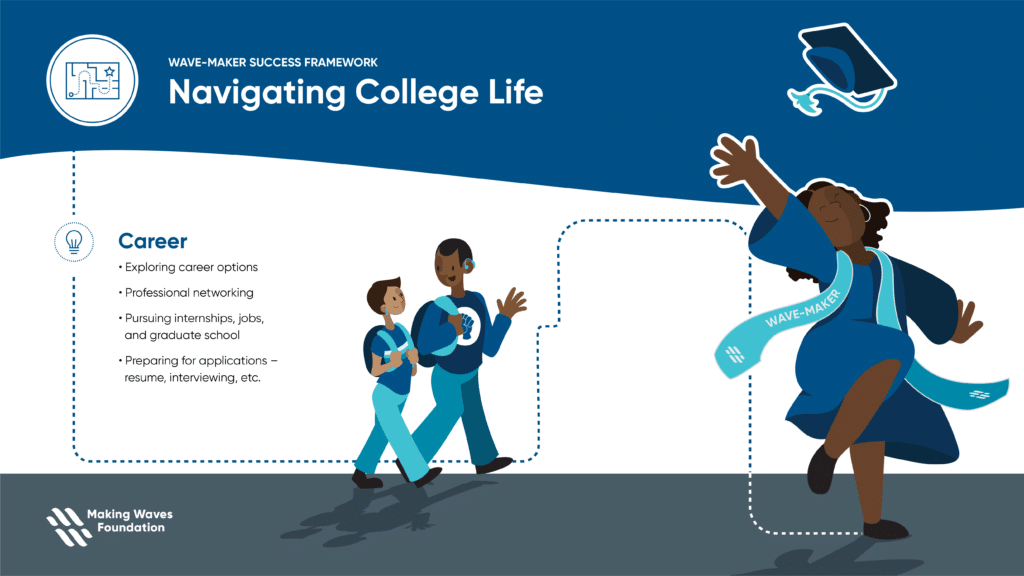
Navigating College Life: Career

Exploring career options
It’s never too early to start thinking about your future career. In fact, the sooner you start exploring your options, the better prepared you’ll be when it comes time to make a decision. But with so many different paths to choose from, how do you know which one is right for you?
Here are a few things to keep in mind as you start exploring your options:
Think about your skills and interests
One of the best ways to narrow down your career options is to think about the skills and interests you have. For example, if you’re a people person who enjoys working with numbers, a career in sales or accounting might be a good fit.
Or, if you’re an outdoorsy person who loves animals, a career in veterinary medicine might be worth considering.
Think about your values
Your values are also an important factor to consider when choosing a career path. Do you want a job that allows you to help others? Or do you prefer a job that provides intellectual stimulation? Perhaps you value creativity and autonomy above all else. Whatever your values may be, make sure they align with the type of work you’ll be doing in your chosen career.
Think about your goals
What are your long-term goals? Do you want to get married and have kids someday? Do you want to buy a house? Or do you want to travel the world? Your answer will help you narrow down your options by identifying which careers will help you achieve your goals. For example, if you want to have a family someday, you’ll need to choose a career that offers good benefits and job security.
When it comes time to choose a career path, there are a lot of factors to consider. But by thinking about your skills and interests, values, and goals, you can narrow down your options and find a path that’s right for you.
Professional networking
College is a time to explore different interests and figure out what you want to do with your life. It’s also a time to start building your professional network. A strong professional network can open doors, provide opportunities, and help you succeed in your career.
Here are four reasons why professional networking is so important:
1. Helps you land a job
A strong professional network can be the key to landing your dream job. If you know someone who works at a company you’re interested in, they can put in a good word for you and help you get your foot in the door. Even if you don’t know anyone at your dream company, networking can still help you find a job that’s a good fit for your skills and interests. Talking to people in your field and getting their advice can give you a better idea of what kind of jobs are out there and how to get them.
2. Keeps you employed
Your professional network doesn’t just help you find a job; it can also help you keep the job you have. If you run into problems at work or need advice on how to handle a difficult situation, talking to someone in your professional network can give you the guidance you need. They can also help you advance in your career by connecting you with people who can help further your development.
3. Opens doors to new opportunities
A strong professional network can give you access to opportunities that would otherwise be unavailable. If you know someone who knows someone, you’ll be able to get your foot in the door for new projects, clients, and ventures. These connections can also lead to new friendships and relationships that enrich your life outside of work.
4. Helps you develop professionally
Your professional network is not just a collection of people who can help further your career; it’s also a group of people who can help you grow as a professional. Talking to people in your field and getting their advice can give you new perspectives on your work and help you develop new skills. These conversations can also inspire new ideas that improve the quality of your work and make you more valuable to your employer.
Professional networking is essential for success in today’s workplace. It helps you find a job, keep the job you have, develop new skills, and access opportunities that would otherwise be unavailable. So start building your professional network today! It could be the key to unlocking all sorts of doors in your career.
Pursuing internships, jobs, and graduate schools
The process of pursuing internships, jobs, and graduate schools can seem daunting, but it doesn’t have to be! By breaking the process down into smaller steps, you can make the task much more manageable.
In this article, we’ll walk you through how to pursue each of these opportunities so that you can land the perfect position for you.
Internships
There are a few different ways to go about pursuing internships. You can start by talking to your professors or your school’s career center to see if they know of any opportunities that would be a good fit for you. You can also search for internships online on websites like Indeed or Handshake. Finally, you can reach out directly to companies that you’re interested in and inquire about internship opportunities.
Jobs
The process of pursuing jobs is similar to pursuing internships. You can start by talking to your professors or your school’s career center to see if they know of any openings that would be a good fit for you. You can also search for jobs online on websites like Indeed or Handshake. Finally, you can reach out directly to companies that you’re interested in and inquire about job openings.
Graduate schools
If you’re interested in pursuing graduate school, the first step is to research programs that interest you. Once you’ve narrowed down your list of schools, reach out to the admissions offices and request more information about the program. Then, fill out and submit your application materials by the deadline.
After that, all you can do is wait and hope for the best!
Pursuing internships, jobs, and graduate schools doesn’t have to be a daunting task — it can actually be quite simple if you break it down into smaller steps.
- First, talk to your professors or your school’s career center to get some ideas about where to look for opportunities.
- Next, search online for postings or reach out directly to companies that you’re interested in.
- Finally, fill out your applications and wait for a response.
By following these steps, you’re sure to land the perfect position for you in no time!
Preparing for applications – resume, interviewing, etc.
If you’re a college student about to apply for internships, jobs, or graduate schools, you’re probably feeling a mixture of excitement and trepidation. On the one hand, you can’t wait to start your career, gain experience, and possibly begin earning a real paycheck. On the other hand, the process of applying— from crafting the perfect application to acing the interview — can be daunting.
But don’t worry! With a little preparation, you’ll be ready to take on any internship, job, or graduate school application with confidence.
Here are a few tips to help you get started:
1. Start by doing your research
Before you start applying for internships or jobs, it’s important to do your research and figure out what you’re interested in. What are your skills? What are your passions? What kind of work environment do you want to be in?
Once you have a good understanding of what you want, you can start looking for opportunities that align with your interests.
2. Utilize your network
One of the best ways to find internships, jobs, and graduate schools is to utilize your network. Talk to your family and friends, and see if they know anyone who could help you out. You’d be surprised how many people are willing to help if they know you’re interested in pursuing a certain opportunity.
3. Get organized
The process of applying for internships, jobs, and graduate schools can be overwhelming, so it’s important to stay organized. Create a spreadsheet or use a tracking system (like Internship Tracker) to keep track of deadlines, requirements, and other important information. This will help you stay on top of everything and ensure that you don’t miss anything important.
When you’re applying for internships or jobs, make sure that your resume and cover letter are up-to-date and look professional. Once you have a draft of your materials, ask a friend or family member to take a look and give you feedback. It’s always helpful to get an outsider’s perspective.
4. Follow up
After you submit your application or resume, make sure to follow up with the employer or school within a week or two. A quick email or phone call shows that you’re interested in the opportunity and that you’re willing to put in the extra effort. This can often be the difference between getting an interview or being passed over for someone else.
5. Preparing for interviews
If you’ve made it through the initial screening process and have been selected for an interview, congratulations! The next step is to start preparing for your interview so that you can put your best foot forward.
The best way to prepare is by doing your research on the graduate school or company ahead of time and practicing your answers to common interview questions. You should also take some time to think about what questions YOU want to ask during the interview. This shows that you’re truly interested in the position and have done your research!
Pursuing internships, jobs, and graduate schools can be a daunting task, but it doesn’t have to be overwhelming if you take the time to do your research and get organized before getting started.
Utilize your network of family and friends, and don’t forget to follow up after submitting your application or resume!
Co-authored with AI
Making Waves Education Foundation generated this text in part with artificial intelligence. Content has been reviewed, edited, and revised to our organization’s liking and we take ultimate responsibility for the content of this publication.
About Making Waves Education Foundation
At Making Waves, we are committed to educational equity. Making Waves Education Foundation is a Bay Area nonprofit that supports Making Waves Academy – a public charter school with more than 1,100 5th through 12th grade students – and leads college and career programming with more than 430 college students.
Knowing the opportunities that come with a college degree, we partner with historically underrepresented and underserved students to help make college affordable and graduation attainable. Centering the journeys of our students, our personalized approach includes college and career coaching, scholarships, and financial planning.
Our alumni network includes more than 730 college graduates, who earn their degrees and land jobs at more than twice the rate of their first-generation, low-income peers, with 85% graduating debt-free.







